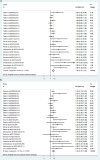Biomarker implication of kallikrein-related peptidases as prognostic tissue substrates of poor survival in colorectal cancer
- PMID: 32581650
- PMCID: PMC7310231
- DOI: 10.1186/s12935-020-01350-4
Biomarker implication of kallikrein-related peptidases as prognostic tissue substrates of poor survival in colorectal cancer
Abstract
Background: Recent studies have demonstrated that the kallikrein and kallikrein-related peptidases (KLKs) exhibit aberrant expression in patients with colorectal cancer (CRC) and might be considered as potential prognostic biomarkers of CRC. However, inconsistent findings have been reported, which promote us to summarize the global prognostic roles of KLKs for survival in CRC patients.
Methods: Eligible published studies were identified by searching electronic databases with several search strategies. The patients' baseline characteristics and survival results were extracted from enrolled studies and pooled as combined hazard ratio (HR) with 95% confidence interval (95% CI) to estimate the effect size.
Results: A total of 25 and 22 eligible studies were included in the meta-analysis to evaluate the prognostic roles of KLKs on overall survival (OS) and disease-free survival (DFS), respectively. KLKs overexpression was significantly associated with worse OS (pooled HR = 1.43, 95% CI 1.27-1.60, P < 0.001) and short DFS (pooled HR = 1.35, 95% CI 1.21-1.51, P < 0.001). Importantly, subgroup and meta-regression analyses revealed the survival differences among different races and detection methods of KLKs. Furthermore, several specific members of KLKs were identified to be more significantly related to worse OS and DFS compared with other members.
Conclusion: The present study demonstrated that KLKs may have the potential to serve as promising biomarkers to monitor CRC prognosis and progression. The promising results concerning the utility of KLKs in clinical practice encourage the further investigation of their clinical utility applicability as tumor markers of CRC.
Keywords: Biomarker; Colorectal cancer; Kallikrein; Prognosis.
© The Author(s) 2020.
Conflict of interest statement
Competing interestsThe authors declare they have no competing interest.
Figures




References
LinkOut - more resources
Full Text Sources

